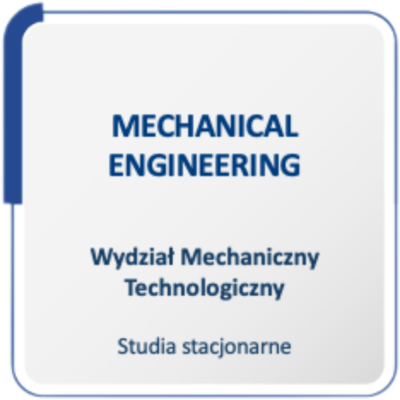- Opis
- Dodatkowe informacje
Opis
Mechanical engineering
| Mode of study | Title obtained | Period of study | Language of instruction | Place of classes | Admission limit |
|---|---|---|---|---|---|
| Full-time | Master of Science (Magister inżynier) |
1,5 years / 3 semesters |
English | Gliwice | 25 |
| WINTER ADMISSION | |||||
Faculty of Mechanical Engineering
Gliwice, 18a Konarskiego St.
phone: 32 237 11 73
e-mail: wmt_rekrutacja@polsl.pl
e-mail: BOSG8@polsl.pl
OPIS KIERUNKU
- stacjonarne II stopnia
- profil: ogólnoakademicki
- termin naboru: rekrutacja letnia
- język prowadzenia zajęć: angielski
- czas trwania studiów: 1,5 roku / 3 semestry
- uzyskany tytuł: magister inżynier
- Strona internetowa kierunku
The master’s degree in Mechanical Engineering will enable you to gain an in-depth knowledge of mechanical engineering and operation of machinery, manufacturing technology and materials technology. The studies are conducted in various specialisations. Of the specialisations offered, a selection is launched each year. The selection depends on the number and preferences of the candidates for the second-degree programme.
The studies are an extension of the advanced topics of the first-degree engineering studies, but there is also the possibility of taking them after completing another course of study. In addition to courses that are shared by all, there are courses that focus on specific topics in accordance with the specialisation, e.g.: related to CNC machine tools or machine safety.
The rapid growth of industrial production and the ongoing fourth industrial revolution, are forcing the development of methods for designing and manufacturing machinery and technological equipment. Production methods are constantly modified, improved, and automated – specialists in mechanical engineering, production processes and materials are therefore essential and desirable on the labour market.
By taking a second-degree study in Mechanical Engineering, you will open up many potential career paths. The programme provides you with a wide range of knowledge, skills and competences required and sought after in modern industry.
No professional internship is provided as part of the second-degree programme. However, students often undertake numerous work placements. The cooperation of the Faculty of Mechanical Engineering with numerous industrial enterprises and the location of the University facilitates such activities for students.
Graduates have in-depth knowledge of mechanical engineering, diagnostics and operation, materials process technology as well as modern manufacturing processes. During their studies, they become familiar with the application of modern methods of modelling, optimisation and virtual verification of products using various computer tools that support these processes. They also acquire knowledge of design process management, pro-ecological technologies, and integrated environmental management systems.
The detailed scope of the knowledge gained depends on the specialisation chosen.
A Master’s degree in Mechanical Engineering deepens your knowledge necessary for a Mechanical Engineer, giving you the opportunity to gain experience about modern solutions used in the engineering industry. Depending on the chosen specialisation, you will gain the knowledge and competence to develop your career as:
– machine designer,
– a technologist, a specialist in various fields – from machining to plastic working, casting, or welding,
– operation and maintenance specialist.
You will also gain in-depth skills related to, among others:
- CNC machine tools and their programming
- Automated manufacturing systems
- Advanced metrology techniques
- Design of manufacturing process control systems
- Modelling complex phenomena using FEM and other numerical methods
- Application of CAx systems
- Technical diagnostics
- Reverse engineering
- Incremental manufacturing technology
- Engineering of structural and special materials
- Metal and plastic processing
- Welding, casting, and forming technology
Łukasz P., director of the EXTERIOR competence center at ENDEGO
The Mechanical Engineering field of studies at the Silesian University of Technology is an area of study that combines engineering theory with practical construction skills. The curriculum covers issues in the field of mechanics, design, materials science and production engineering, preparing graduates to work in various industry sectors.
In my case, my studies turned out to be a good introduction to the profession of a mechanical engineer. When designing components for the automotive industry, I felt well prepared and equipped with the required knowledge, which I expanded over the years of work.
Currently, as a department head in our company, we very often recruit graduates of our university, and I am particularly happy to do it knowing that someone has studied Mechanical Engineering.
Krzysztof Z., Manager of the Hot Galvanizing Plant at Ekochron
Studies of Mechanical Engineering field of study at the Faculty of Mechanical Engineering allowed me to learn the theoretical basis of my interests related to mechanics, computer science and automation. The combination of theory and practice resulted in broadening the horizons of new possibilities and allowed me to discover new areas of knowledge related to the industry. Both the theoretical knowledge acquired during my studies and professional practice have made it possible for me to implement further elements of mechanization, robotics and automation with great satisfaction in everyday professional work.
I recommend the field of Mechanical Engineering to everyone who feels attracted to technical issues.
Dodatkowe informacje
| Tytuł | magister inżynier |
|---|---|
| Stopien | Stopień II |
| Forma | Stacjonarne |
| Język | Angielski |
| Kierunek | Mechanical engineering |
| Miasto | Gliwice |
| Profil | ogólnoakademicki |
| Rekrutacja | Zimowa |
| Wydział | Wydział Mechaniczny Technologiczny |




